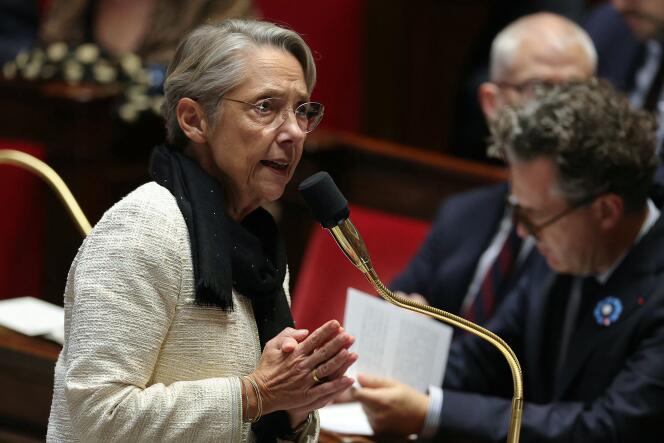Sometimes a 49.3 can hide a vote in session. Tuesday, November 7 at the very end of the evening, Prime Minister Elisabeth Borne once again had recourse to this article of the Constitution which allows a text to be passed to Parliament without a vote, during the examination of the second part of the draft budget for 2024, which covers the expenditure of ministries. It’s number 16e times she has used it since taking office at Matignon in 2022.
“None of the opposition groups seem to want to move away from their principled position: reject the budget whatever it contains,” she declared to the cries of the opposition on Tuesday evening, while the second part of the budget has been examined in the Chamber for a week. But the text submitted to 49.3 is in reality the result of a double-trigger compromise, which should enable it to facilitate the adoption of another bill which was to arrive in the Hemicycle on Wednesday, November 8.
In its discussions with the oppositions in recent days, the executive has indeed agreed to satisfy certain requests relating to the 2024 finance bill in the hope of obtaining sufficient abstentions on another budgetary text, the draft end-of-management finance law – which covers 2023. This text, which now replaces the traditional end-of-year budget correction, adjusts the budgets of the various ministries to take into account the contingencies occurring during 2023.
The political stakes are less than on the budget, because it only contains occasional openings and closings of credits, intended to rebalance the accounts at the end of the year. It is notably devoid of tax measures, or other measures in favor of purchasing power, unlike the amending budget of the end of 2022. Nevertheless: the executive is ready to monetize the abstention of oppositions to avoid a 49.3 of moreover, always heavy to assume politically.
Expansion of the fuel check
Matignon and Bercy have thus secured the support of the independent group Libertés, independents, overseas and territories (LIOT) on this end-of-management text, by agreeing to extend the fuel check to a greater number of beneficiary households, in the draft budget for 2024. The fuel check, implemented at the start of 2023 in the face of rising prices at the pump, compensates up to 100 euros for the 50% of the lowest-income households who work (the first 5 deciles) and who use their vehicle, or 8 million beneficiaries. This aid, however, was little requested by households, since only half of the planned credits were actually used (430 million euros compared to 800 million budgeted).
You have 55% of this article left to read. The rest is reserved for subscribers.
